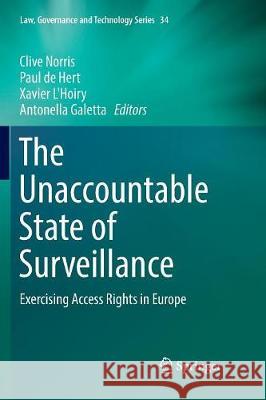The Unaccountable State of Surveillance: Exercising Access Rights in Europe » książka
topmenu
The Unaccountable State of Surveillance: Exercising Access Rights in Europe
ISBN-13: 9783319837703 / Angielski / Miękka / 2018 / 499 str.
Kategorie:
Kategorie BISAC:
Wydawca:
Springer
Seria wydawnicza:
Język:
Angielski
ISBN-13:
9783319837703
Rok wydania:
2018
Wydanie:
Softcover Repri
Ilość stron:
499
Waga:
0.70 kg
Wymiary:
23.39 x 15.6 x 2.62
Oprawa:
Miękka
Wolumenów:
01
Dodatkowe informacje:
Wydanie ilustrowane











